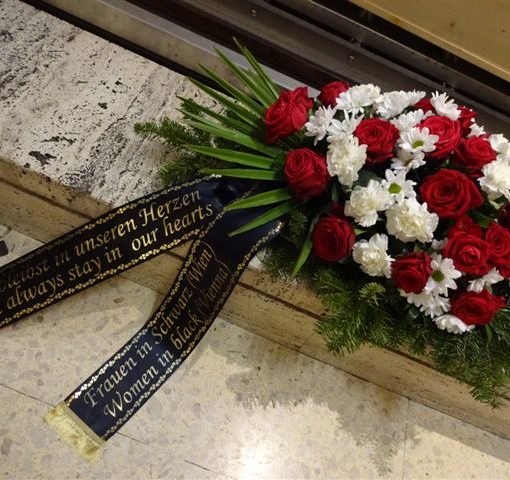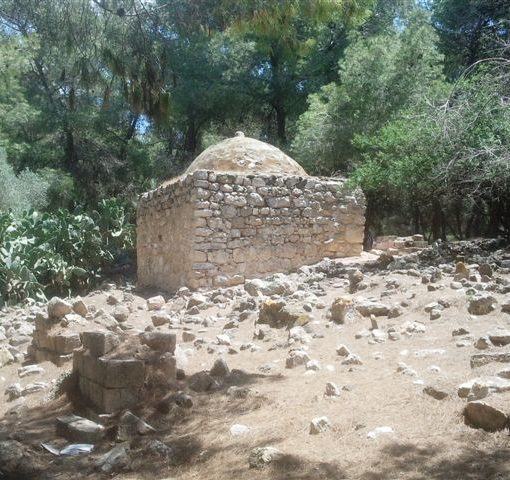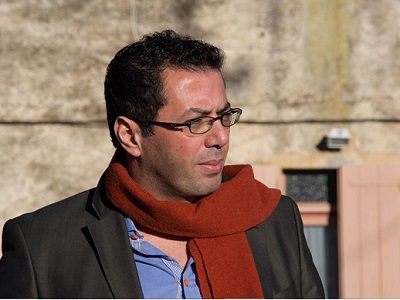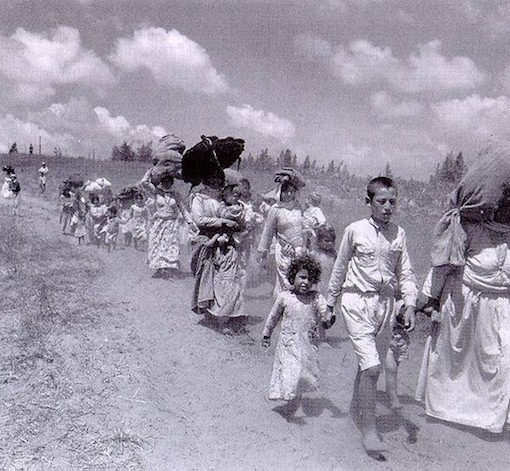To commemorate ‘Israel Apartheid Week’, WiB Vienna held a vigil on 24.03 in the City center with posters depicting the sufferings of the Palestinians in the city of Hebron.
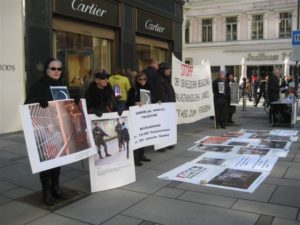
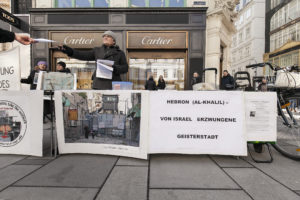
Standing for the vigil were 12 women and men activists among whom was Ruth Fruchtmann the author of ‘Jerusalem Tag’. Many passersby including tourists coming for the Easter holidays accepted our fliers and showed interest in this theme. Of course there were also those who showed disapproval and called us ‘Liars’.
We distributed over 100 flyers:
Israeli Apartheid Weeks 2018
Al Khalil / Hebron – a Ghost City Enforced by Israel
“Hope has two beautiful daughters:
Their names are anger and courage.
Anger that things are the way they are.
Courage to make them the way they ought to be.”
(St Augustine)
Israel’s Apartheid: The example of Hebron / Al Khalil:
• 800 Israeli settlers have transformed the city of approximately 200,000 Palestinian
inhabitants into a ghost city. Part of the city (including the old city, with Shuhada Street), called
Zone H2, is under complete Israeli military control.
• 42% of the Palestinian houses have been dispossessed.
• 77% of the businesses have been compulsorily closed.
• The Israeli army has forbidden Palestinians from using the most important North-South Street
(the most important shopping street) since 1994.
• Israel’s authorities fail systematically to stop violent attacks of the settlers on Palestinians.
Some of the solders are themselves settlers or sons and daughters of settlers.
• There is no protection of Palestinians by Israeli soldiers and police. They observe the settlers’
attacks without reacting. They do not even protect Palestinian children from the attacks of the
settlers on their way to and from school. The only protection for children is by activists of the
voluntary human rights groups, Christian Peacemakers Teams and the Ecumenical
Accompaniment Program in Palestine and Israel (EAPPI), who accompany the children every
day.
• The violence on Palestinian people reached their highest point by end of 2015. Approximately
one third of these occurrences took place in Al Khalil (Hebron) where on the average, from the
beginning of October until the end of December 2015 a Palestinian was killed or wounded
every 3 hours. Until today the situation for the inhabitants of Hebron has not changed.
The Old City of Al Khalil /Hebron, located in the “H2 area”, i.e. under complete Israeli military control,
has been subject since mid-November 2015 to new dramatic restrictions. Israeli soldiers confiscated
numerous houses in the Tel Rumeida district and hindered the residents from leaving or entering the
area. The declared the area to a military zone, similar to parts of East Jerusalem.
The 50 families living in Tel Rumeida have to register with the Israeli authorities. The new regulations
are a serious problem for their freedom of movement. They must undergo strict security controls each
time they leave or enter their houses.
The Israeli human rights group B’tselem declared “this development is immoral, draconian and
unrealistic” and “it causes a collective punishment of the inhabitants of Hebron who are suspected and
forced, though innocent, to suffer serious disturbances in everyday life.”
Tel-Rumeida-Checkpoint, Hebron
Photo: Megan Hanna
A military spokesman declared that the measures were a reaction to the increased violence and are
directed to the separation of the Jewish from the Palestinian population of the city. As with Operation
“Breathing Closure” the plans are decreed as uncertain “precautionary measures” in order to limit
“future potential attacks and to maintain the well-being of the Israelis”.
Especially young Palestinian boys and men are targeted by the Israeli soldiers. In the Old City on 26
October 2015 Saad al-Atrash, 19, was wounded with 7 bullets of Israeli soldiers, left lying on the
street for 40 minutes and bled to death. This crime was called by Amnesty International a “special
monstrous case, which could be compared more to an unusual lynching than an act of self
defence.”
Al Khalil’s / Hebron’s Old City – A Ghost City
The statistics are hardly able to describe the hard reality of the daily life of the Palestinians currently
living in Hebron. For years the businesses, shops and most of the houses of Shuhada Street, the old
bazaar and the direct surroundings have been closed by Israeli compulsory decree. Many have been
abandoned to be ruined. Thousands of families have lost their income. For 2 ½ years the inhabitants
feel more insecure than ever. They do not know where or what the soldiers will do to them. Al Khalil /
Hebron is an individual case compared with other cities of the West Bank, by the presence of
approximately 800 Zionist settlers living in confiscated houses and supported and protected by double
this number of Israeli soldiers, based primarily around 18 military checkpoints. They make the lives of
30,000 Palestinian inhabitants (Zone H2, Old City) vehemently more difficult. Although the city is used
to repression, violence and military controls, it has experienced no such extreme measures since the
Goldstein Massacre*), when Israel cordoned off whole areas and ordered a 24 hour curfew for 6
months (Yitzhak Rabin punished the victims!). The new military restrictions have lasted already for 2 ½
years.
Since 9 years the local NGO “Youth Against Settlements” (YAS)
(https://www.facebook.com/media.vyas/) calls for an international campaign – OPEN SHUHADA
STREET. There are activities held in Hebron and worldwide. The activists from YAS are frequently
attacked by Israel with harassments, arrests and bans. Issa Amro leader of YAS, often arrested, had
his last trial at Israeli military court on 20 February 2018. His offences are all connected to non-violent
campaigns for Open Shuhada Street and demonstrations for freedom and justice.
Israel carries on with land confiscation and the installation of new settlements. On 5 March 2018 a
settlement outpost was installed on the land of a Palestinian family in Beit Einun, northeast of the city
of Hebron (Hebron district). In February settlers attacked family members while they were planting
olive trees on their land. Israeli soldiers arrested 12 family members, olive saplings were uprooted by
settlers. The family is frightened of Israeli harassment, more violence and arrests. (Alternative
Information Center (AIC), Jerusalem, www.alternativenews.org)
*) The Ibrahimi (Abraham) Mosque is a holy place, for Jews as for Moslems. According to tradition the
tombs of Abraham, Isaac and Jacob are located here. In 1994 the Jewish settler Baruch Goldstein
committed an act of terror by which he killed 29 praying Palestinians before he was killed by the
survivors. His grave is honored by Jewish settlers like a holy person. The President at that time,
Yitzhak Rabin, could have closed the settlement Kiryat Arba, from which Goldstein came, but instead
imposed a month-long curfew on the Palestinian inhabitants of Hebron.
